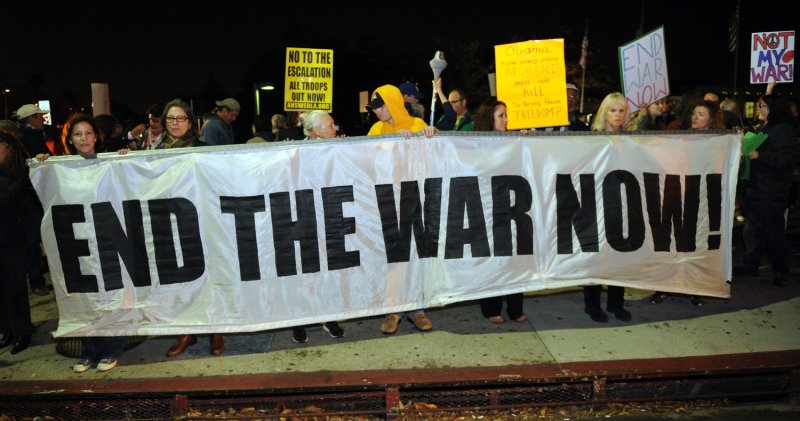Anti-war demonstrators protest against the announcement of a US troop increase for Afghanistan, at a rally outside the Federal Building in Los Angeles on December 2, 2009. US President Barack Obama has ordered 30,000 extra troops to Afghanistan and the NATO chief said other countries would send 5,000 soldiers, amid growing pressure to find a way out of the unpopular war. As the US death toll for 2009 hit a record 300, Obama vowed in a nationwide speech from the West Point Military Academy that a military withdrawal would start by July, 2011. UPI/Jim Ruymen |
License Photo
WASHINGTON, Sept. 9 (UPI) -- We should have declared the Afghan war won last May 3, the day after a U.S. SEAL team killed Osama bin Laden and buried him in the Arabian Sea. That was the advice given in Washington this week by a former spy chief who played a key role in the Saudi-Pakistan-U.S. alliance that defeated the Soviet Union in Afghanistan in early 1989. The Soviet empire imploded nine months later.
U.S.- and British-educated, Prince Turki al-Faisal headed the Saudi intelligence service for 25 years until a few weeks before 9/11. He later became the Saudi ambassador to the United Kingdom and then the United States before retiring from government service. He now runs the King Faisal Cultural Foundation, named after his late father.
"You sent Special Forces into Afghanistan on Oct. 7, less than one month after 9/11, to punish al-Qaida.," Prince Turki said in Washington this week. "And you chased al-Qaida out of Afghanistan in the Battle of Tora Bora during the first 10 days of December as survivors, including bin Laden, escaped into Pakistan. That would have been another time to declare victory."
Instead, the United States, its NATO allies and other friendly nations sent in more troops, ostensibly to keep punishing al-Qaida remnants in Afghanistan, estimated by the United States at 50 to 100 -- the same number given 10 years later by newly sworn in U.S. Defense Secretary Leon Panetta.
U.S. President Barack Obama was always against the Iraq war but campaigned on a pro-Afghan war platform "because that's where al-Qaida is." Actually, al-Qaida had left Afghanistan eight years before. And cynics say Obama had to be in favor of one war otherwise he would have been taxed with pacifism and anti-military attitudes.
Prince Turki sees nothing but stalemate on the Afghan horizon so what's the point of wasting more blood and treasure and further eroding America's NATO links?
Canada's Afghan contingent was called home by an act of Parliament. So were Dutch troops. And the German military contribution is constantly under attack in the Bundestag as a war based on a falsehood, namely the erroneous official notion that some 5,000 German soldiers are there to fight international terrorism.
America's European allies say the Afghan war is against a feudal theocracy, not al-Qaida. Polls indicate some 70 percent of Germans say they are against their military involvement.
Besides, the German contingent isn't authorized to launch kinetic operations. They can only fight in self-defense.
The French are more interested in helping Libyan rebels and former French colonies in sub-Sahara Africa.
U.S. opinion is 65 percent against continuing what is seen increasingly as a pointless and costly war in both blood and treasure ($500 billion in 10 years). Based on casualty counts, today's situation is worse than in 2009. In fact, August was the deadliest month for U.S. troops with 65 killed.
Under Obama's plan, 10,000 U.S. troops will be withdrawn by the end of this year and 23,000 by September 2012. And the rest of the 100,000 U.S. troops presently in-country to be out by 2014.
With Taliban knowing roughly the U.S. timetable, all they have to do is strike from time to time to show that they are still around, and avoid hitting infrastructure, including schools, roads and communications, built by U.S contractors, they now know they will inherit.
A Foreign Policy magazine article headlined, "Mission Accomplished. Finally" echoed the growing sentiment that 10 years after 9/11, it's time for Obama to call an end "to America's adventures abroad."
The cognoscenti say that waiting till 2014 to exit will be Vietnam redux. Three more years of bad news is bound to be interrupted by a congressional vote demanding an immediate end to hostilities and formal negotiations with Taliban for a cease-fire to begin to wind things down.
Those who argue against a cease-fire to facilitate a withdrawal say that Taliban will simply invite al-Qaida back.
To which the stand pat school retorts, "Why would Mullah Omar, the titular head of the Taliban, ask back those responsible for the loss of his country?" He has indicated more than once to Pakistani interlocutors that he isn't in the business of international terrorism. And if a new post-war Afghan regime were foolish enough to invite al-Qaida back, he knows that U.S. air power could flatten the country he, Mullah Omar, had just recovered.
So far, the War on Terror, including Homeland Defense, Iraq and Afghanistan, defense spending geared specifically to these two wars, U.S. and foreign contractors, military death benefits, long-term care for wounded, has cost an estimated $5 trillion -- all on Uncle Sam's credit card.
U.S. and coalition military killed in action in Iraq: 4,800. In Afghanistan: 2,800. U.S. military wounded in action: 44,000. U.S. military suicides since 2001: 2,130. Civilians killed: about 900,000 Iraqis and 30,000 Afghans.
The geopolitical toll is staggering. In Iraq today, Iran has more influence than the United States and in Afghanistan there is no solution without Taliban.















